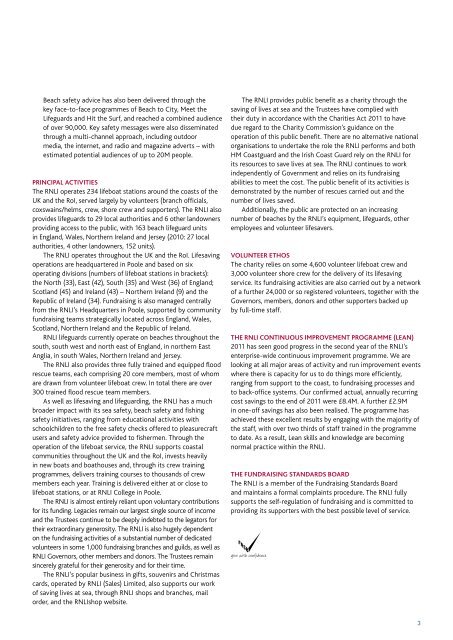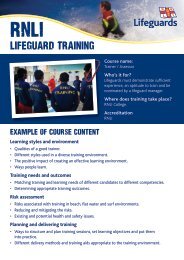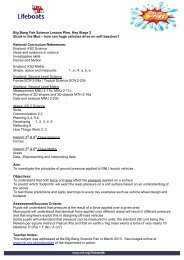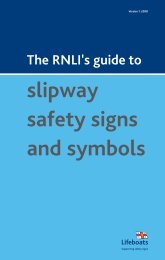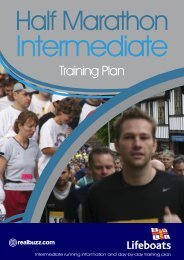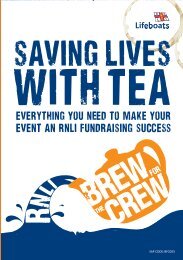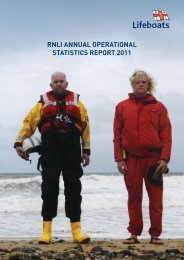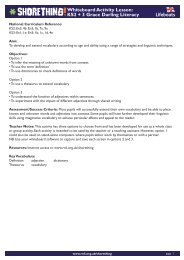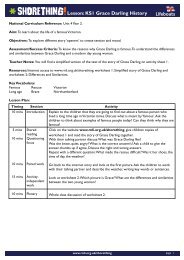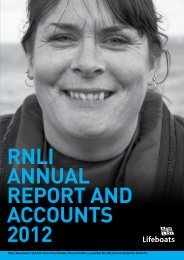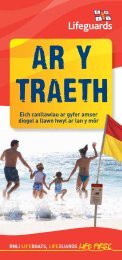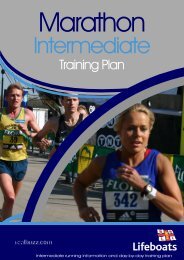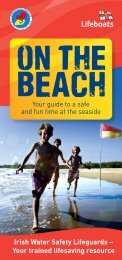RNLI ANNUAL REPORT AND ACCOUNTS 2011
RNLI ANNUAL REPORT AND ACCOUNTS 2011
RNLI ANNUAL REPORT AND ACCOUNTS 2011
- No tags were found...
You also want an ePaper? Increase the reach of your titles
YUMPU automatically turns print PDFs into web optimized ePapers that Google loves.
Beach safety advice has also been delivered through thekey face-to-face programmes of Beach to City, Meet theLifeguards and Hit the Surf, and reached a combined audienceof over 90,000. Key safety messages were also disseminatedthrough a multi-channel approach, including outdoormedia, the internet, and radio and magazine adverts – withestimated potential audiences of up to 20M people.PRINCIPAL ACTIVITIESThe <strong>RNLI</strong> operates 234 lifeboat stations around the coasts of theUK and the RoI, served largely by volunteers (branch officials,coxswains/helms, crew, shore crew and supporters). The <strong>RNLI</strong> alsoprovides lifeguards to 29 local authorities and 6 other landownersproviding access to the public, with 163 beach lifeguard unitsin England, Wales, Northern Ireland and Jersey (2010: 27 localauthorities, 4 other landowners, 152 units).The <strong>RNLI</strong> operates throughout the UK and the RoI. Lifesavingoperations are headquartered in Poole and based on sixoperating divisions (numbers of lifeboat stations in brackets):the North (33), East (42), South (35) and West (36) of England;Scotland (45) and Ireland (43) – Northern Ireland (9) and theRepublic of Ireland (34). Fundraising is also managed centrallyfrom the <strong>RNLI</strong>’s Headquarters in Poole, supported by communityfundraising teams strategically located across England, Wales,Scotland, Northern Ireland and the Republic of Ireland.<strong>RNLI</strong> lifeguards currently operate on beaches throughout thesouth, south west and north east of England, in northern EastAnglia, in south Wales, Northern Ireland and Jersey.The <strong>RNLI</strong> also provides three fully trained and equipped floodrescue teams, each comprising 20 core members, most of whomare drawn from volunteer lifeboat crew. In total there are over300 trained flood rescue team members.As well as lifesaving and lifeguarding, the <strong>RNLI</strong> has a muchbroader impact with its sea safety, beach safety and fishingsafety initiatives, ranging from educational activities withschoolchildren to the free safety checks offered to pleasurecraftusers and safety advice provided to fishermen. Through theoperation of the lifeboat service, the <strong>RNLI</strong> supports coastalcommunities throughout the UK and the RoI, invests heavilyin new boats and boathouses and, through its crew trainingprogrammes, delivers training courses to thousands of crewmembers each year. Training is delivered either at or close tolifeboat stations, or at <strong>RNLI</strong> College in Poole.The <strong>RNLI</strong> is almost entirely reliant upon voluntary contributionsfor its funding. Legacies remain our largest single source of incomeand the Trustees continue to be deeply indebted to the legators fortheir extraordinary generosity. The <strong>RNLI</strong> is also hugely dependenton the fundraising activities of a substantial number of dedicatedvolunteers in some 1,000 fundraising branches and guilds, as well as<strong>RNLI</strong> Governors, other members and donors. The Trustees remainsincerely grateful for their generosity and for their time.The <strong>RNLI</strong>’s popular business in gifts, souvenirs and Christmascards, operated by <strong>RNLI</strong> (Sales) Limited, also supports our workof saving lives at sea, through <strong>RNLI</strong> shops and branches, mailorder, and the <strong>RNLI</strong>shop website.The <strong>RNLI</strong> provides public benefit as a charity through thesaving of lives at sea and the Trustees have complied withtheir duty in accordance with the Charities Act <strong>2011</strong> to havedue regard to the Charity Commission’s guidance on theoperation of this public benefit. There are no alternative nationalorganisations to undertake the role the <strong>RNLI</strong> performs and bothHM Coastguard and the Irish Coast Guard rely on the <strong>RNLI</strong> forits resources to save lives at sea. The <strong>RNLI</strong> continues to workindependently of Government and relies on its fundraisingabilities to meet the cost. The public benefit of its activities isdemonstrated by the number of rescues carried out and thenumber of lives saved.Additionally, the public are protected on an increasingnumber of beaches by the <strong>RNLI</strong>’s equipment, lifeguards, otheremployees and volunteer lifesavers.VOLUNTEER ETHOSThe charity relies on some 4,600 volunteer lifeboat crew and3,000 volunteer shore crew for the delivery of its lifesavingservice. Its fundraising activities are also carried out by a networkof a further 24,000 or so registered volunteers, together with theGovernors, members, donors and other supporters backed upby full-time staff.THE <strong>RNLI</strong> CONTINUOUS IMPROVEMENT PROGRAMME (LEAN)<strong>2011</strong> has seen good progress in the second year of the <strong>RNLI</strong>’senterprise-wide continuous improvement programme. We arelooking at all major areas of activity and run improvement eventswhere there is capacity for us to do things more efficiently,ranging from support to the coast, to fundraising processes andto back-office systems. Our confirmed actual, annually recurringcost savings to the end of <strong>2011</strong> were £8.4M. A further £2.9Min one-off savings has also been realised. The programme hasachieved these excellent results by engaging with the majority ofthe staff, with over two thirds of staff trained in the programmeto date. As a result, Lean skills and knowledge are becomingnormal practice within the <strong>RNLI</strong>.THE FUNDRAISING ST<strong>AND</strong>ARDS BOARDThe <strong>RNLI</strong> is a member of the Fundraising Standards Boardand maintains a formal complaints procedure. The <strong>RNLI</strong> fullysupports the self-regulation of fundraising and is committed toproviding its supporters with the best possible level of service.3


